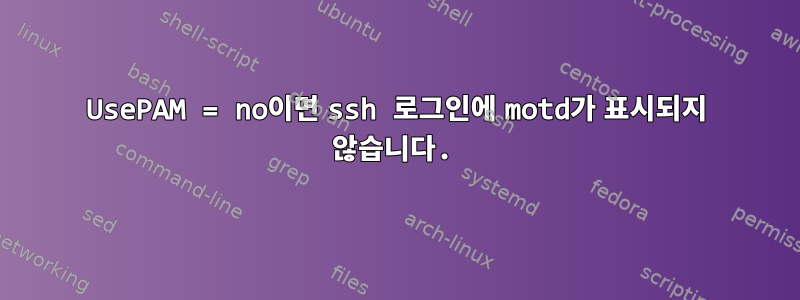
나는 그것을 사용자 정의했으며 다음을 /etc/motd통해 로그인하면 올바르게 표시됩니다 ssh.
Welcome to Ubuntu 16.04.6 LTS (GNU/Linux 2.6.32-042stab141.3 x86_64)
* Documentation: https://help.ubuntu.com
* Management: https://landscape.canonical.com
* Support: https://ubuntu.com/advantage
* Ubuntu 20.04 LTS is out, raising the bar on performance, security,
and optimisation for Intel, AMD, Nvidia, ARM64 and Z15 as well as
AWS, Azure and Google Cloud.
https://ubuntu.com/blog/ubuntu-20-04-lts-arrives
<< contents of /etc/motd >>>
Last login: Sun May 17 21:41:54 2020 from 37.30.54.65
그런 다음 설정을 UsePAM으로 변경했는데 no결과는 다음과 같습니다.
Last login: Sun May 17 21:41:54 2020 from 37.30.54.65
환영 화면을 유지 UsePAM하고 계속 보고 싶습니다 .no
답변1
/etc/motd일반적으로 PAM이 시스템에 표시되는 일을 담당하는 것 같습니다 .
UsePAM no로 설정된 경우 PAM을 사용하지 않을 때도 인쇄하도록 sshd_config설정해야 합니다 .PrintMotd yessshd/etc/motd
Ubuntu는 이를 사용하여 여러 소스(그리고 아마도 스크립트에 의해 생성된 다른 콘텐츠... 또는 제가 올바르게 기억한다면 이와 유사한 것)로부터 pam_motd.so매일 메시지를 작성한다는 점에 유의하십시오./etc/motd/etc/motd.d/*update-motd/var/motd.dynamic
sshdMOTD 루틴이 더 간단할 수 있으므로 전체 메시지가 /etc/motd.
답변2
나는 논평할 수 없습니다. 이것은 기술적으로 답변이 아닙니다. 나는 같은 문제를 가지고있다. 공개 키 인증 이외의 다른 인증은 활성화하고 싶지 않기 때문에 PAM을 비활성화하고 싶습니다. 물론 PAM을 활성화하고 설정할 수 있습니다.
PasswordAuthentication no
그래서 PAM을 다시 활성화했고 이제 MOTD가 다시 나타납니다. PAM 없이 MOTD를 활성화하는 방법을 잘 모르겠습니다(그래서 이것이 실제로 답변은 아니지만,가능한도움이 되는)
답변3
또한 환영 화면을 유지 UsePAM하고 계속 보고 싶습니다 .no
-files의 위치가 motd변경되어 /etc/update-motd.d/환영 화면을 볼 수 있을 것 같습니다 run-parts /etc/update-motd.d/.
예를 들어 로그인할 때 볼 수 있도록 run-parts /etc/update-motd.d/하단에 추가할 수 있습니다 .~/.profile
에서 영감을 받다:https://til.hashrocket.com/posts/rymit7rzif-view-the-motd-after-login-in-ubuntu


